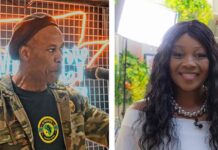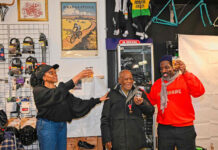Eminent dub-poet, scholar and political-activist, Linton Kwesi Johnson was born in rural Jamaica and moved to the UK as a youth to join his parents. They were part of the “Windrush Generation” – people invited over to the UK to aid the rebuilding of the UK post-WWII
Debi Ghose, presenter of the Brixton Allstars radio-show, spoke to him 30 years after the Brixton Riots.
When you first moved to London, what did you think of the British culture and how you were accepted into the UK?
Well, those of us who came from the Caribbean were coming from a British colony, so the British way of life was not alien to us. We spoke the English language, we were socialising to the cultural institutions familiar to Britain, we studied English literature and knew more about English history than we knew about our own history! The actual culture was not difficult, what was difficult was the racial hostility that we met when we came here.
When did you join the Black Panthers?
I joined the Black Panther movement in the late 1960s. I became interested as a schoolboy – I think I saw one of the newspapers that they used to sell on a Saturday, then started to attend meetings and joined the organisation’s youth section. Around that time, there was a Black Power movement in the USA, which had been preceded by a Civil Rights movement by Martin Luther King and the Southern Leadership Conference, so there was a wave of consciousness of Black Awakening for young people on both sides of the Atlantic. Our generation felt that we could no longer tolerate the things that our parents had tolerated and we wanted to change the society, so we got involved with those organisations that we thought were more effective in bringing about racial equality and social justice.
What did being part of the Black Panthers give you?
Being a Panther was a life changing experience for me, because for the first time I discovered Black history; I learnt about African culture, I discovered Black literature in terms of creative writing, novels, poetry and so on. It opened up a whole new world for me and was a profound influence. It was in the Panthers that I learned about the rudiments of organisation – how one goes about mobilising support and building a movement for change.
Was it at that point that you started writing poetry?
I came to poetry through politics, as a consequence to my involvement with the Black Panther movement and discovering Black literature. I was inspired to articulate in verse how I felt, and how the generation of Black youth to which I belonged felt about growing up in a racialised society.
Can you explain what the Brixton Riots were retaliating against?
What was happening, for want of a better term, was racial oppression. People were being discriminated against and victimised. We were constantly harassed, intimidated, beaten, and a significant section of us were criminalised – some people even died in police custody. It was very difficult to get justice in the courts, especially magistrates courts where it was your word against a police officer’s. You stood a better chance of getting justice with a jury, but all that was poisoned by politicians exploiting race, like Mrs Thatcher who talked about Britain being swamped by an alien culture; at that time, it created an atmosphere which made it very difficult for a black person or any ethnic minority person to get a not-guilty verdict in a court of law. There was discrimination in the place of work, people were racially abused, in school we were relegated to a third class education, and so on.
How did you feel when the situation culminated in the riots?
It was a feeling of sheer exhilaration that we’d had the chance to fight back and to give the police a bit of their own medicine which we had been taking for the longest time. It was a feeling of power. It was a feeling that things would never be the same again, and that sense of power came from what had happened 6 weeks before that – black people had marched through the streets of London to protest the death of 13 young blacks in a racist arson attack in a fire in New Cross on the 18th of January. That big march was called the Black People’s Day of Action and happened on the 2nd of March, and 6 weeks later the Brixton Riots happened. So that sense of power that we had felt from seeing 20,000 people marching through London – you can’t imagine it. That gave us a sense that we could change our situation and help London to become a better place, and rid it of the extremes of racial injustice.
How long was it after the riots that you felt changes?
The changes didn’t come until the end of the ‘80s, beginning of the ‘90s – and those changes came largely because of the British State sitting up and taking note of the fact that Black people had some power. Not just because of what was happening in Brixton, because there were subsequent riots here again in 1985 and also in Tottenham, but these were national events because we had uprisings in nearly every major inner city area of the country; Toxteth in Liverpool, Moseyed in Manchester, Handsworth in Birmingham, St Paul’s in Bristol. The government’s response eventually was to put in place policies to speed up the emergence of a black middle class, and to take down some of the barriers. This happened under the watch of Michael Hesseltine, who was the Minister of the Environment, and they put in place “inner city urban renewal” policies, and that’s when the changes began to happen. I think the decisive event was the Black People’s Day of Action, because riots are spontaneous, but when you see a set of people who have been down-trodden, have the ability to mobilise nationally and put 20,000 people on the streets – that is an expression of power.
In this time of financial crisis, does it remind you at all of the situation in the ‘80s?
No, not at all. In the ‘80s, this country was far more polarised. A class war was being waged by the Tories against organised labour. Mrs Thatcher’s government wanted to claw back all the gains that the working class had won for themselves in the post-WW2 settlement. It was a period of heightened racial tension, you had groups like the National Front on the rise with their paramilitary wing – Column 88. It was a period when racist attacks were rampant, there was of course the New Cross fire when 13 young Blacks died – but we’ve moved on from that situation. There is no idealogical warfare going on in this country now. Once the Labour Party used to represent organised Labour, now all the political parties in this country represent corporate interest – they all represent business. The situation has changed, the context has changed, and in many respects things have changed for the better. Blacks have been instrumental in helping these changes, and in helping to change Britain, we’ve changed ourselves too.







[…] disregard for the lives of African refugees trying to enter Europe. The event ended on the upbeat. Linton Kwesi Johnson, Howe’s comrade from the Race Today Collective, performed a piece of impromptu dub […]
Growing up a pakeha in Aotearoa, I loved listening to Linton’s thundering poetry echoing the rage and will to succeed of the Black people in the eighties. I’ve been living in Brixton for six years now, and it’s so cool to hear Mr Johnson’s thoughts. Full power to him.
Excellent post! I enjoyed reading it very much.
Poetry will never loose it’s touch even as we enter this digital age. Thanks for sharing.
A Poem for Mothers